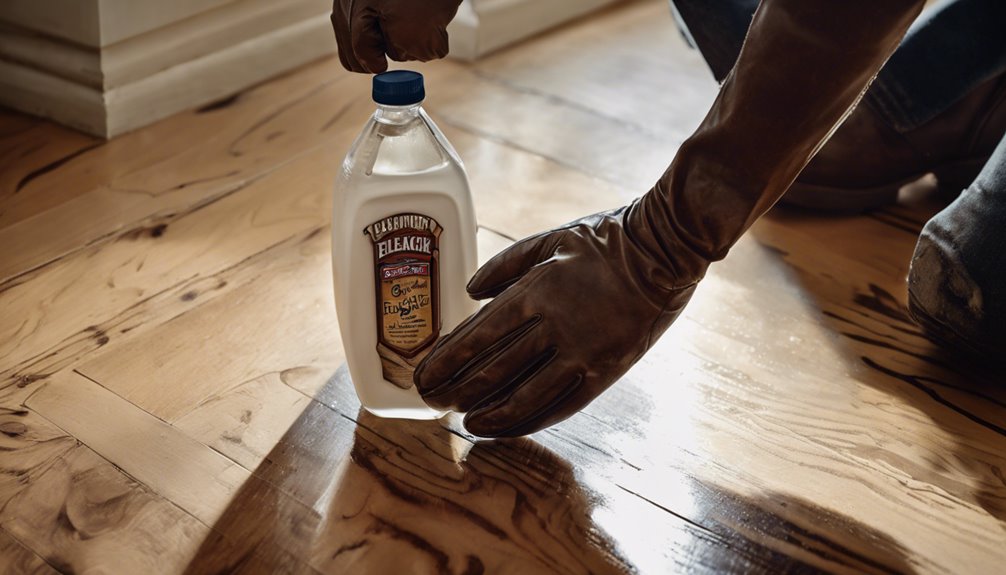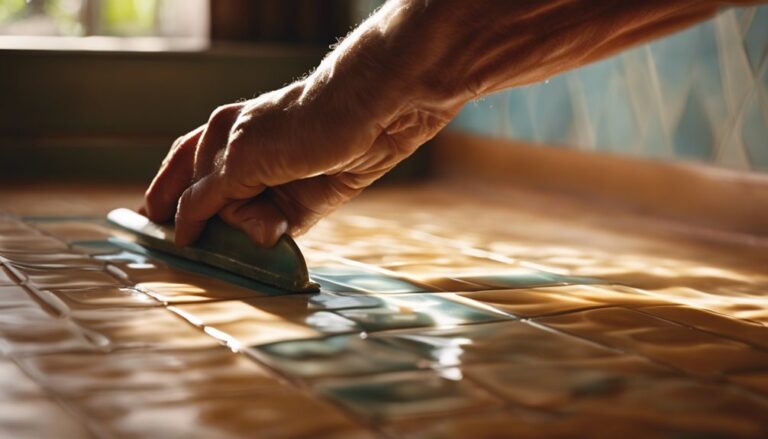No, you shouldn't use bleach on hardwood floors. While bleach can disinfect and remove stains, it also damages the wood. The harsh chemicals strip natural oils, causing dryness and potentially discoloration. Over time, this can weaken the wood's structure and ruin its finish. Instead, opt for milder cleaning solutions like vinegar and water or pH-balanced wood cleaners, which effectively clean without harming your floors. Regular maintenance and prompt spill management are essential for preserving your hardwood's beauty. If you want to explore proper cleaning techniques and maintenance tips, there's more useful information available.
Understanding Hardwood Floor Materials
When you're considering cleaning your hardwood floors, it's important to understand the materials involved. Different hardwood species, like oak, maple, and cherry, each have unique characteristics that affect their durability and maintenance. Knowing the specific species in your home helps you choose the right cleaning method. Additionally, floor finishes—whether they're oil-based, water-based, or wax—play an essential role in how your floors react to cleaning products. Some finishes may be more susceptible to damage from harsh chemicals, while others might be more resilient. By identifying your hardwood species and understanding the floor finish, you can select cleaning solutions that preserve the beauty and integrity of your floors, allowing you the freedom to maintain your space without worry.
The Properties of Bleach
When using bleach on hardwood floors, it's crucial to understand its chemical composition and how it interacts with wood finishes. You should also be aware of potential safety concerns and the precautions you need to take. Knowing these properties can help you make informed decisions about cleaning your floors effectively and safely.
Chemical Composition of Bleach
Bleach, a common household chemical, primarily consists of sodium hypochlorite, which is responsible for its powerful disinfecting properties. Understanding its chemical structure helps you grasp how it interacts with surfaces. Here are some key points about bleach's active ingredients:
- Sodium hypochlorite is the main component.
- It releases chlorine when diluted, enhancing its effectiveness.
- The chemical reacts with organic materials, breaking them down.
- Bleach solutions typically contain water and stabilizers to prolong shelf life.
Using bleach can be effective for cleaning, but it's essential to know its composition before applying it to hardwood floors. Remember, while it's a strong cleaner, it can also impact the surface, so weigh your options carefully.
Effects on Wood Finish
Understanding the chemical composition of bleach is important, especially regarding its effects on wood finishes. When you use bleach on hardwood floors, you risk wood finish degradation. The harsh chemicals in bleach can strip away protective sealants that are vital for maintaining the beauty and integrity of your floors. This degradation can lead to a dull appearance and make your wood more susceptible to stains and moisture damage. If you want to keep your hardwood looking vibrant, it's essential to avoid using bleach or to at least be aware of the potential risks involved. Instead, consider gentler cleaning alternatives that won't compromise your wood finish or protective sealants, ensuring your floors remain in great condition for years to come.
Safety Concerns and Precautions
Although bleach is a powerful cleaning agent, it comes with significant safety concerns that you need to take into account before using it on hardwood floors. First and foremost, make certain you're protecting yourself and your cleaning environment. Here are some essential precautions:
- Always wear appropriate safety gear, like gloves and goggles.
- Ensure proper ventilation to avoid inhaling harmful fumes.
- Keep bleach away from pets and children.
- Test a small area first to see how the wood reacts.
Pros of Using Bleach
When considering ways to maintain the cleanliness of your hardwood floors, using bleach can offer several advantages. Its cleaning effectiveness shines, especially when tackling stubborn stains. Bleach not only disinfects but also helps in stain removal, giving your floors a renewed appearance.
| Advantage | Benefit |
|---|---|
| Cleaning Effectiveness | Removes tough stains easily |
| Disinfecting Power | Eliminates bacteria and germs |
| Cost-Effective | Affordable cleaning solution |
| Quick Results | Fast-acting for immediate results |
Cons of Using Bleach
While bleach has its advantages for cleaning hardwood floors, there are significant drawbacks to contemplate. Using bleach can lead to serious issues that might not be immediately apparent.
- It can cause wood damage, leading to discoloration or deterioration of the floor's finish.
- The harsh chemicals can strip natural oils from the wood, resulting in a dry, cracked surface.
- Long term effects may include weakened structural integrity, making your floors more susceptible to wear and tear.
- Additionally, bleach can create harmful fumes that pose health risks to you and your pets.
Considering these factors, it's essential to weigh the pros against these potential cons before deciding to use bleach on your hardwood floors. Your flooring deserves better care for lasting beauty and durability.
Safe Cleaning Alternatives
If you're looking for safe alternatives to bleach for cleaning your hardwood floors, vinegar and water can be a great option. A simple mixture of these two can effectively cut through dirt without damaging your wood. Alternatively, using a mild soap can also give you a thorough clean while being gentle on the surface.
Vinegar and Water Solution
A simple vinegar and water solution can be an effective and safe alternative for cleaning hardwood floors. This natural cleaner offers several vinegar benefits while maintaining cleaning efficiency. Here's why you should consider it:
- It's non-toxic and safe for your family and pets.
- Vinegar helps to cut through grime and dirt effectively.
- The solution can eliminate odors and leave a fresh scent.
- It's an affordable option compared to commercial cleaners.
To use this solution, mix equal parts of vinegar and water in a spray bottle. Lightly mist the floor, then wipe with a soft cloth or mop. You'll enjoy a clean, shiny floor without the harsh chemicals, giving you the freedom to maintain a healthy home environment.
Mild Soap Option
When looking for safe cleaning alternatives for your hardwood floors, a mild soap solution can be an excellent choice. Using mild soap benefits your floors by effectively removing dirt without causing damage. It's gentle and won't strip your finish, keeping your hardwood looking pristine. To create your solution, mix a few drops of mild liquid soap with water in a bucket. Dampen a soft mop and gently clean the surface, ensuring you don't oversaturate the wood. Other soap alternatives, such as castile soap, can also work well, providing similar benefits. By choosing a mild soap option, you can maintain your hardwood's beauty while safely tackling everyday messes. Remember, a little goes a long way!
Best Practices for Cleaning
While bleach can be effective for certain cleaning tasks, it's important to follow best practices to protect your hardwood floors. To guarantee you're cleaning safely and effectively, keep these tips in mind:
- Use a diluted bleach solution; never apply it directly.
- Test the solution on a small, inconspicuous area first.
- Limit cleaning frequency with bleach to avoid damage.
- Follow up with a thorough rinse to remove any residue.
Incorporating these maintenance tips not only keeps your floors looking great but also prolongs their lifespan. Remember, regular cleaning and mindful product choices can make all the difference. By adopting these best practices, you can maintain the beauty and integrity of your hardwood floors without compromising their quality.
Maintaining Hardwood Floors
Maintaining hardwood floors requires consistent care to keep them looking their best. Establishing regular cleaning schedules helps prevent dirt buildup and scratches. A few simple steps can make a big difference.
| Task | Frequency |
|---|---|
| Dusting/Vacuuming | Weekly |
| Mopping | Monthly |
| Reapplying Protective Coating | Every 1-3 years |
Using protective coatings can extend the life of your floors and maintain their shine. Make sure to address spills immediately to prevent stains, and avoid using harsh chemicals. By following these practices, you'll enjoy your beautiful hardwood floors for years to come, giving you the freedom to enjoy your space without worry.
When to Seek Professional Help
If you notice signs of significant wear, damage, or persistent stains on your hardwood floors, it's time to contemplate seeking professional help. A professional assessment can save you time and prevent further damage. Here are some key indicators that warrant calling in the experts:
- Deep scratches or gouges that affect the wood
- Water damage or warping that's beyond DIY repair
- Stains that won't budge, regardless of cleaning methods
- Uneven surfaces that make walking hazardous
A specialized cleaning service can restore your floors' beauty and integrity, ensuring they last longer. Don't hesitate to reach out when your hardwood floors need expert attention—you'll regain that freedom of movement and aesthetic appeal in no time.
Frequently Asked Questions
Can Bleach Remove Stains From Hardwood Floors Effectively?
Ever wondered if bleach can really tackle those tough stains on your hardwood floors? While it might seem like a quick fix, using bleach isn't the best choice for stain removal. It can damage the wood and finish. Instead, consider safer cleaning alternatives like vinegar or specialized wood cleaners that won't harm your floors. Keeping your hardwood beautiful is all about choosing the right products that maintain its integrity and shine.
How Often Can I Use Bleach on Hardwood Floors?
Using bleach on hardwood floors isn't recommended regularly. In fact, frequency guidelines suggest you should avoid it altogether, as harsh chemicals can damage the wood. Instead, stick to a cleaning schedule that includes gentle cleaners suitable for hardwood. If you encounter tough stains, consider using bleach sparingly and only as a last resort. Always test in a small area first to verify it won't harm your beautiful floors.
Does Bleach Damage the Finish on Hardwood Floors?
Imagine walking on beautifully maintained floors, free from harsh chemicals. When you use bleach, it can indeed damage the finish on your hardwood, leading to dullness and discoloration. Instead of risking your floors, think about bleach alternatives that effectively clean without causing harm. Regular hardwood maintenance with gentle cleansers will keep your floors looking pristine, allowing you the freedom to enjoy your space without worry. Keep it safe and stylish!
Can I Mix Bleach With Other Cleaning Products?
You shouldn't mix bleach with other cleaning products due to potential product interactions that can create harmful fumes. For cleaning safety, it's essential to use bleach alone or with water. Mixing it with ammonia or other cleaners can lead to dangerous reactions. If you want effective cleaning without risks, stick to one product at a time, ensuring your space remains safe and you can enjoy your cleaning routine without worry.
What Should I Do if Bleach Spills on Hardwood Floors?
Oh no, you've turned your hardwood floor into a mini science experiment with bleach! First, grab some paper towels to blot up as much as you can—don't rub, or you'll spread it. Next, rinse the area with water and dry it thoroughly. Consider using bleach alternatives for your hardwood maintenance in the future. After all, your floor deserves a break from harsh chemicals, and so do you! Stay free from spills!




